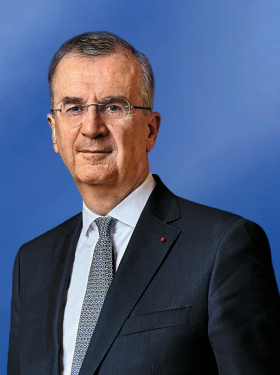- Home
- Governor's speeches
- Frankfurter Allgemeine Zeitung : « To be...
Frankfurter Allgemeine Zeitung : « To be independent is to be pragmatic »

François Villeroy de Galhau, Governor of the Banque de France
Published on 31st of March 2023

Interview of François Villeroy de Galhau, governor of Banque de France.
Governor, banks are once again a source of concern. Is it possible to separate price stability from financial market stability?
The two recent crises that engulfed Silicon Valley Bank (SVB) and Credit Suisse occurred outside the euro area. Europe’s financial sector, and especially its banking sector, is sound. If we compare today’s situation with that of 2008/2009, the sector is much better supervised now, through the Banking Union, and also considerably more secure, thanks to the Basel III framework, which has bolstered capital and liquidity positions.
Are monetary policy goals at odds with those of stabilising the banking sector?
This is a fashionable idea at the moment, but I find it overdone. The goals are not necessarily incompatible, and we use different instruments to achieve them. For the great majority of European banks, higher interest rates are beneficial. Unlike SVB, they have a diversified deposit base and are not massively invested in bonds. Accordingly, they are not adversely impacted by increased rates. If however action were needed on financial stability, this would be effected chiefly through temporary liquidity instruments, which would not conflict with the increase in interest rates needed to ensure price stability.
There was a history to the Credit Suisse crisis – it did not come out of nowhere – but the crash was more sudden than expected. What is the greatest risk facing the euro area financial system?
Weak profitability and excessive risk-taking had both been problems for Credit Suisse for a number of years. At the moment, I see no significant European bank that has these two problems. Credit Suisse had begun to address its specific issues, but not quickly enough, and was overtaken by events, owing to developments in the United States and the announcement by the bank’s Saudi Arabian shareholder.
So we don’t need to move forwards in regulating banks in Europe?
We already have made huge advances! We can always make regulation and supervision better, but, overall, the Basel III framework and harmonised supervision within the Banking Union work strongly in tandem in Europe. We, Europeans, have learned the lessons of the 2008/2009 financial crisis. We saw in the United States what could happen if supervision remained overly regional and if Basel III was not sufficiently applied.
Let us talk about inflation. The ECB has made vast amounts of money available to the markets in recent years. Are we now seeing the consequences of this expansionary monetary policy?
No. Back in March 2020, there was a threat of deflation. Today, Europe is grappling with too much inflation, and monetary policy has responded to this new situation over the last year and more. But no one could seriously suggest that excess liquidity is at the root of today’s inflation: what we are seeing is the result of supply shocks. Europe’s money supply has slowed drastically. In fact, if inflation was driven by money supply and liquidity, the latest numbers would actually be reassuring. But that would be misleading…
…even if the money supply statistics are unreliable, are we already seeing the effects of higher interest rates on the money supply?
I am not saying that the monetary statistics are unreliable, rather that they do not predict inflation. Without delving too deeply into economic theory, monetarist theories made a useful contribution in their time, based around a simple relationship between monetary aggregates and inflation. But a key assumption of these theories is that the velocity of money is stable. This no longer applies, for a variety of economic and technological reasons. The mechanical link no longer exists.
So how do interest rates affect inflation?
We estimate that there is a transition period of about one to two years. We announced rate hikes approximately one year ago, and since July of last year we have acted very decisively, raising rates by 3.5 percentage points in the space of eight months – the fastest increase ever carried out. This means that a fairly powerful impact is yet to come. It is instructive to see how inflation is easing in the United States and especially in Canada, which began hiking rates earlier. Wherever and whenever they are used, interest rates are an effective weapon.
In what way are they effective?
First, through the expectations channel. When the central bank states, independently and credibly, that it will do everything in its power to bring inflation back to 2%, it steers the expectations of financial markets, companies and households. Second, through the real channel, as financial conditions tighten and credit becomes more expensive and therefore less plentiful. This prevents demand from outstripping supply.
But food inflation has really exploded in recent months. How can this surge be curbed?
The supply shocks, driven by the post-Covid recovery in 2021 and then the invasion of Ukraine in early 2022, impacting energy and then agricultural – and hence food – prices, have been spectacular. These are the increases that our fellow citizens feel most keenly. But they are not expected to last. I want to stress this point: global energy prices began falling from mid-2022, which is why headline inflation has been declining for some months: in the euro zone it dropped from 10.6% last October to 6.9% in March, which is good news. Food prices are expected to follow suit: global agricultural prices have been cooling since the end of last year, but it will take a few quarters for this effect to feed through. According to our euro area forecasts, after a sharp bump, food prices are expected to decline fairly significantly between now and the end of the year, which should bring headline inflation down.
Are you saying that you have done enough to tackle the inflation problem?
Certainly not! Food and energy account for just one-quarter of the average consumption basket in Europe. That leaves the remaining three-quarters – the so-called “underlying inflation” – comprising one-half services and one-quarter manufactured goods. This inflation is lower at 5.7%, but could persist for longer. We will only win the battle against inflation once we have also dealt with underlying inflation. The ECB will get inflation back towards 2% by between end-2024 and end-2025: this is a commitment, not just a forecast. So there is no question of giving up now. Although we have completed most of our rate-hiking journey, we may possibly still have a little way to go. After that, we need to stay the course for as long as necessary.
How do you see the relationship between monetary and fiscal policy?
There was a point when they spontaneously moved in the same direction, as part of the accommodative response needed to cope with the Covid shock. Now, monetary policy primarily needs to combat inflation. Our job is not to finance debt, whether of governments or the private sector. Fiscal policy, meanwhile, needs to target gradual deleveraging. I would also like discussions to have a more qualitative focus: we talk about big numbers but not about content or what we expect from spending. We need to do a better job of curbing current and operating expenditure, while investing more in the future.
Inflation in France is lower because of the energy shield, which was introduced earlier than in Germany. Was this a good thing to do?
I believe that the shield plays a role in cushioning the shock and preventing “second-round effects”, that is, immediate wage increases designed to offset rising energy prices. This gives economic participants breathing space to adjust. Over time, however, this approach does not get rid of higher energy prices. Christine Lagarde and I have both said that if fiscal measures are kept in place for too long in Europe, they could support persistent inflation by stoking energy demand. In the medium term, the role of governments should be to promote the transformation of the economy and to grow productive supply.
We have been talking about supply-side policy for a long time. But is it not the central banks that decide it?
True, but you raise a very important point: over the last three years, our public leaders have had to manage a string of emergencies, including Covid, the return of inflation and, sadly, the war in Ukraine. The danger is that this could cause us to lose sight of our long-term goals. Europe is lagging behind in the two major transitions – energy and digital. These transformations are regarded as less pressing and are not always very popular. But they are critical if we want to boost our productive capacity, tame inflation over the long run and, most importantly, raise our potential growth. This is how we will free up additional resources to fund the climate transition, or education. If we want to strengthen Europe’s economy over the long run, we will not do it through fiscal or monetary policy, which focus on the short term. Thankfully, Europe introduced its Next Generation EU programme in 2020. We need to set exacting standards for the reforms that accompany the investments under this programme. By the way, I believe that this is a splendid agenda for the Franco-German alliance to pursue together.
…along with finalising the Capital Markets Union, according to many people. Is CMU really such a vital project?
I believe so, and so does my friend and colleague Joachim Nagel. While the two transitions that I mentioned are going to generate huge investment requirements, we Europeans have the necessary resources through our private savings. When we talk about CMU, it is often viewed as merely “financial plumbing”. But, in fact, this is how we will finance our future. To give one example, by increasing equity financing for businesses through cross-border capital, we can foster innovation. Expressed as a percentage of GDP, corporate equity is two and a half times higher in the United States than in Europe.
Assuming that monetary policy hawks and doves exist, it is said that it is not they that determine the outcome – it is those in the middle. There are policy experts in Germany who say that you make the difference. Is that true?
What is certainly true is that I have always refused to be a hawk or a dove. I have always claimed to be pragmatic. You know about my personal ties to Germany. I firmly believe in independence and recognise that this heritage is something we owe to the Bundesbank. But when we talk about independence, we are not just talking about independence from political or private interests, but also from predetermined theoretical ideas. I am sometimes surprised by pronouncements that strike me as somewhat dogmatic or premature. If I do not look at the facts first, I cannot hope to achieve effective results. Meeting after meeting, by steering our policy instruments based on the economic indicators available to us, we fulfil our mandate and serve the citizens of Europe. To be independent is also to be pragmatic.
Updated on the 21st of November 2023